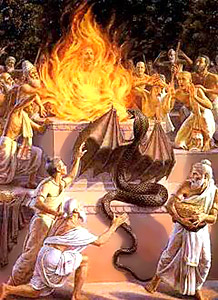 Takshaka was the younger brother of the Adityas and is said to be the ruler of snakes according to Hindu Mythology. He was one of the Nagas named in Mahabharata. Takshaka lived in a city called Takshasila that was his new territory after his entire race was shunned by Pandavas, which was led by Arjuna. Further, as per Hindu mythology, Takshaka is also described as the King of Nagas and the friend of Lord Indra. Formerly, Takshaka lived in Kurukshetra and in Khandava Forest. He and Aswasena were companions who lived in Kurukshetra on the banks of River Ikshumati.
Takshaka was the younger brother of the Adityas and is said to be the ruler of snakes according to Hindu Mythology. He was one of the Nagas named in Mahabharata. Takshaka lived in a city called Takshasila that was his new territory after his entire race was shunned by Pandavas, which was led by Arjuna. Further, as per Hindu mythology, Takshaka is also described as the King of Nagas and the friend of Lord Indra. Formerly, Takshaka lived in Kurukshetra and in Khandava Forest. He and Aswasena were companions who lived in Kurukshetra on the banks of River Ikshumati.
Takshaka revenged the wrongs of Pandavas that was committed upon his race. He poisoned the food of king Parikshit, who was the grandson of Arjuna. Further, he also forestalled any possibility of getting any medical help to the ill king. He bribed a priest of the Kasyapa clan, who was considered to be an expert in healing individuals from snake-poisoning. Later Janamejaya also fought warfare at Takshasila and ousted the Nagas, who were led by Takshaka. Thus, later he became a robber who looted everything valuable from travellers crossing through his area. New stronghold of Takshaka and the Kingdom of Paushya were situated close to Takshasila. One of the victims of Takshaka was Utanka when he was passing through the territory of this snake king. Utanka, after visiting King Janamejaya, invoked the anger towards Takshaka and the entire Naga race. Thus, following this Janamejaya started a campaign against the Naga race at Takshasila with the objective of eradicating them. Takshaka left the domain and entered Deva territory where he asked for protection from Lord Indra. But soon after, the army of King Janamejaya traced him and brought him for execution along with other chiefs of the Naga race. At that point of time, a sage named Astika came and intervened. His father was a Brahmin and his mother was a Naga. Janamejaya listened to the words of Astika and set the Naga king free. Further, he also ordered to stop execution of the Nagas and finally ended all enmity. From that time onwards the Kurus and Nagas lived in peace.




















